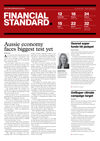Editor's Choice
Santos receives takeover offer from Abu Dhabi-led consortium
Santos has received a non-binding $8.89 per share cash offer from the XRG Consortium, led by XRG P.J.S.C., a subsidiary of Abu Dhabi National Oil Company (ANDOC), alongside Abu Dhabi's sovereign wealth fund ADQ and US private equity firm Carlyle.
What do the best-functioning boards look like?
|The best-functioning boards are future thinkers, understand their ESG responsibilities and are able to show their "battle scars," according to two governance experts.
Funding lifts for climate, health, people startups
|While funding for impact startups has broadly declined, those operating in climate, health and people has seen funding levels improve compared to three years ago, according to the Impact Startups Benchmark Report 2025.
Mind the gap: Investors' role in balancing fairness and competitiveness in executive pay
Investors have a significant role to play in helping to move the dial on executive remuneration, aiming to increase fairness and reduce inequality.



















Imposing a levy on imports that maintains CO@ emissions at local levels MUST include the emissions generated from inbound freight. Then we will some non-sensical product imports.
I imagine it would then kill off the proposal to import potatoes from Canada, for example.
As an employee in the manufacturing sector, I sense that industry is concerned at the downstream cost increases for energy consumption from a tax imposed on producers for CO2 emissions. Our operations in NSW incurred a 30% hike in electricity costs last year.
if a $20 a tonne levy is ever passed through to businesses buying electricity, it will push the cost up another 20%. In marginalising domestic manufacturing, has anyone considered balancing this domestic impost with penalties on energy intensive competitor imports?
Could we not impose an even playing field where importers are required to maintain CO2 emissions at the local level, without going into the territory of protectionism?
I think a lot of the anger being displayed throughout the national electorate is because the impost of a tax implies ONLY that business and consumers will use less fuel & electricity when the cost jumps a further 25%. Where are the pro-active policies for renewables, imports and alternates to balance this community cost?
I understand that electricity userd in NSW will be hit with 42% rises in charges over the next few years due to current infrastructure plans, on top of last year's 30% rise. Now we forsee government layering another 25% based on carbon dioxide emissions.
So the power cost doubles over 3-4 years.
How many businesses in NSW will consequently disappear?
Where is the capacity in substitutes?
Why isn't Paul Howes making a big noise about this?